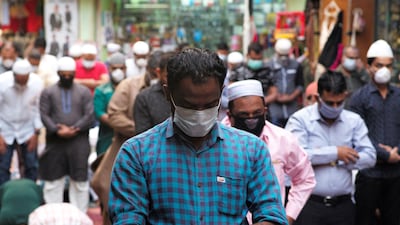A leading health expert has praised Bahrain’s decision to establish “a war room” to help combat the coronavirus, one of a suite of “proactive” measures including strong public engagement that has so far forestalled community spread of the outbreak.
Britain’s former director of public health, professor John Ashton, has been advising the Crown Prince Salman bin Hamad on his country’s response to Covid-19 and has flown out to the Gulf state twice since the onset of the outbreak.
Prince Salman contacted Mr Ashton after he saw him giving media interviews where he called for openness and transparency when handling the new virus.
"I've been very critical about the fact they [Britain] haven't been doing that whereas Bahrain have been doing it there from the outset, publishing the data regularly, holding regular press conferences and generally seeking to engage the community. They are involving everybody in the war against the virus," he told The National.
There have been 189 cases of coronavirus found in Bahrain, and no deaths have been reported do far.
The state-run Bahrain News Agency reported on Saturday that a further 16 people had recovered from the virus, bringing the total number of recoveries to 60.
Mr Ashton's comments come after a meeting on Thursday in which senior government ministers sat with parliamentary heads to inform them of the latest developments to stop the spread of the virus in Bahrain. Interior minister, Shaikh Rashid bin Abdullah, said the meeting was at the direction of the king to inform politicians and then inform the public of all the latest news.
Mr Ashton pointed out that almost all of the cases in Bahrain had visited Iran.
“Of the first 160 people that came in, 50 per cent of them turned out to be corona positive,” he said.
Mr Ashton described Bahrain as having set up “a war room” where health professionals triaged pilgrims and other groups suspected to have contracted coronavirus, under control of the Crown Prince.
“They’ve been very systematic, very proactive, very thorough and to date, they’ve got nearly 200 cases, but haven’t got any community spread. They haven’t lost anybody either,” he said.
“They have a very interesting treatment protocol, which is quite a complex mixture of treatments that they are using under the direction of the military doctor who’s running the war room,” he added.
Some Bahrainis are still stranded in Iran but the government is trying to return them on flights – the first one was on Tuesday.
The Bahraini government has insisted it will not leave any national stranded and will work to bring them home.
On Thursday, Prince Salman called on everyone to join the "nationwide campaign” against the virus and described every citizen as a soldier in the fight.
He particularly praised medical teams working to stem the flow of new cases, earning them international praise.
Mr Ashton said that the kingdom had also been more open with the public regarding the outbreak than he has seen in the UK.
Bahrain has been holding regular televised press briefings and the state-run Bahrain News Agency published regular updates on cases, treatments and those who have recovered.
“I’m impressed that after I identified some of the weak links in the chain of control for them, they immediately responded to deal with them,” he said, adding that it made him “embarrassed” about the British approach to tackling the virus.
He said the initial vulnerability for the kingdom was being able to tighten down on international arrivals and departures.
But he said the main challenge Bahrain has faced is all of the religious tourists that have travelled to Iran to visit holy sites.
The religious balance between Sunni and Shia in Bahrain means that many in the country travel frequently to religious sites in Iran.
“It’s the centenary of Bahrain this year and with those cultural differences between the two sides of Islam, they see this [the coronavirus outbreak] as an opportunity to get everyone together against a common threat,” he said.
The professor said Bahrainis were “transcending’ sectarian and political differences with measures to combat the outbreak.
Mr Ashton’s words echoed Shaikh Rashid’s comments on Thursday in which he warned that the current crisis shouldn’t be politicized and he rejected sectarianism.
But Mr Ashton also warned that like most countries, Bahrain still had challenges to come.
“They’ve got a big challenge ahead because they have a couple of thousands of these religious pilgrims need to come home. But they’ve been very committed to working in harmony with the public and sharing everything they know.”
Company%20profile
%3Cp%3E%3Cstrong%3ECompany%20name%3A%20%3C%2Fstrong%3EXare%C2%A0%3C%2Fp%3E%0A%3Cp%3E%3Cstrong%3EStarted%3A%20%3C%2Fstrong%3EJanuary%2018%2C%202021%C2%A0%3C%2Fp%3E%0A%3Cp%3E%3Cstrong%3EFounders%3A%20%3C%2Fstrong%3EPadmini%20Gupta%2C%20Milind%20Singh%2C%20Mandeep%20Singh%C2%A0%3C%2Fp%3E%0A%3Cp%3E%3Cstrong%3EBased%3A%20%3C%2Fstrong%3EDubai%C2%A0%3C%2Fp%3E%0A%3Cp%3E%3Cstrong%3ESector%3A%20%3C%2Fstrong%3EFinTech%C2%A0%3C%2Fp%3E%0A%3Cp%3E%3Cstrong%3EFunds%20Raised%3A%20%3C%2Fstrong%3E%2410%20million%C2%A0%3C%2Fp%3E%0A%3Cp%3E%3Cstrong%3ECurrent%20number%20of%20staff%3A%20%3C%2Fstrong%3E28%C2%A0%3C%2Fp%3E%0A%3Cp%3E%3Cstrong%3EInvestment%20stage%3A%20%3C%2Fstrong%3Eundisclosed%3C%2Fp%3E%0A%3Cp%3E%3Cstrong%3EInvestors%3A%20%3C%2Fstrong%3EMS%26amp%3BAD%20Ventures%2C%20Middle%20East%20Venture%20Partners%2C%20Astra%20Amco%2C%20the%20Dubai%20International%20Financial%20Centre%2C%20Fintech%20Fund%2C%20500%20Startups%2C%20Khwarizmi%20Ventures%2C%20and%20Phoenician%20Funds%3C%2Fp%3E%0A
Company Profile
Company name: Fine Diner
Started: March, 2020
Co-founders: Sami Elayan, Saed Elayan and Zaid Azzouka
Based: Dubai
Industry: Technology and food delivery
Initial investment: Dh75,000
Investor: Dtec Startupbootcamp
Future plan: Looking to raise $400,000
Total sales: Over 1,000 deliveries in three months
Mercer, the investment consulting arm of US services company Marsh & McLennan, expects its wealth division to at least double its assets under management (AUM) in the Middle East as wealth in the region continues to grow despite economic headwinds, a company official said.
Mercer Wealth, which globally has $160 billion in AUM, plans to boost its AUM in the region to $2-$3bn in the next 2-3 years from the present $1bn, said Yasir AbuShaban, a Dubai-based principal with Mercer Wealth.
“Within the next two to three years, we are looking at reaching $2 to $3 billion as a conservative estimate and we do see an opportunity to do so,” said Mr AbuShaban.
Mercer does not directly make investments, but allocates clients’ money they have discretion to, to professional asset managers. They also provide advice to clients.
“We have buying power. We can negotiate on their (client’s) behalf with asset managers to provide them lower fees than they otherwise would have to get on their own,” he added.
Mercer Wealth’s clients include sovereign wealth funds, family offices, and insurance companies among others.
From its office in Dubai, Mercer also looks after Africa, India and Turkey, where they also see opportunity for growth.
Wealth creation in Middle East and Africa (MEA) grew 8.5 per cent to $8.1 trillion last year from $7.5tn in 2015, higher than last year’s global average of 6 per cent and the second-highest growth in a region after Asia-Pacific which grew 9.9 per cent, according to consultancy Boston Consulting Group (BCG). In the region, where wealth grew just 1.9 per cent in 2015 compared with 2014, a pickup in oil prices has helped in wealth generation.
BCG is forecasting MEA wealth will rise to $12tn by 2021, growing at an annual average of 8 per cent.
Drivers of wealth generation in the region will be split evenly between new wealth creation and growth of performance of existing assets, according to BCG.
Another general trend in the region is clients’ looking for a comprehensive approach to investing, according to Mr AbuShaban.
“Institutional investors or some of the families are seeing a slowdown in the available capital they have to invest and in that sense they are looking at optimizing the way they manage their portfolios and making sure they are not investing haphazardly and different parts of their investment are working together,” said Mr AbuShaban.
Some clients also have a higher appetite for risk, given the low interest-rate environment that does not provide enough yield for some institutional investors. These clients are keen to invest in illiquid assets, such as private equity and infrastructure.
“What we have seen is a desire for higher returns in what has been a low-return environment specifically in various fixed income or bonds,” he said.
“In this environment, we have seen a de facto increase in the risk that clients are taking in things like illiquid investments, private equity investments, infrastructure and private debt, those kind of investments were higher illiquidity results in incrementally higher returns.”
The Abu Dhabi Investment Authority, one of the largest sovereign wealth funds, said in its 2016 report that has gradually increased its exposure in direct private equity and private credit transactions, mainly in Asian markets and especially in China and India. The authority’s private equity department focused on structured equities owing to “their defensive characteristics.”
Killing of Qassem Suleimani
Nayanthara: Beyond The Fairy Tale
Starring: Nayanthara, Vignesh Shivan, Radhika Sarathkumar, Nagarjuna Akkineni
Director: Amith Krishnan
Rating: 3.5/5
The specs
Engine: 2.0-litre 4cyl turbo
Power: 261hp at 5,500rpm
Torque: 405Nm at 1,750-3,500rpm
Transmission: 9-speed auto
Fuel consumption: 6.9L/100km
On sale: Now
Price: From Dh117,059
Results
57kg quarter-finals
Zakaria Eljamari (UAE) beat Hamed Al Matari (YEM) by points 3-0.
60kg quarter-finals
Ibrahim Bilal (UAE) beat Hyan Aljmyah (SYR) RSC round 2.
63.5kg quarter-finals
Nouredine Samir (UAE) beat Shamlan A Othman (KUW) by points 3-0.
67kg quarter-finals
Mohammed Mardi (UAE) beat Ahmad Ondash (LBN) by points 2-1.
71kg quarter-finals
Ahmad Bahman (UAE) defeated Lalthasanga Lelhchhun (IND) by points 3-0.
Amine El Moatassime (UAE) beat Seyed Kaveh Safakhaneh (IRI) by points 3-0.
81kg quarter-finals
Ilyass Habibali (UAE) beat Ahmad Hilal (PLE) by points 3-0
Skoda Superb Specs
Engine: 2-litre TSI petrol
Power: 190hp
Torque: 320Nm
Price: From Dh147,000
Available: Now
Key facilities
- Olympic-size swimming pool with a split bulkhead for multi-use configurations, including water polo and 50m/25m training lanes
- Premier League-standard football pitch
- 400m Olympic running track
- NBA-spec basketball court with auditorium
- 600-seat auditorium
- Spaces for historical and cultural exploration
- An elevated football field that doubles as a helipad
- Specialist robotics and science laboratories
- AR and VR-enabled learning centres
- Disruption Lab and Research Centre for developing entrepreneurial skills
Results
%3Cp%3E%3Cstrong%3EStage%207%3A%3C%2Fstrong%3E%3Cbr%3E1.%20Adam%20Yates%20(GBR)%20UAE%20Team%20Emirates%20%E2%80%93%203hrs%2029min%2042ses%3Cbr%3E2.%20Remco%20Evenepoel%20(BEL)%20Soudal%20Quick-Step%20%E2%80%93%2010sec%3Cbr%3E3.%20Geoffrey%20Bouchard%20(FRA)%20AG2R%20Citroen%20Team%20%E2%80%93%2042sec%3Cbr%3E%3Cstrong%3EGeneral%20Classification%3A%3C%2Fstrong%3E%3Cbr%3E1.%20Remco%20Evenepoel%20(BEL)%20Soudal%20Quick-Step%3Cbr%3E2.%20Lucas%20Plapp%20(AUS)%20Ineos%20Grenaders%20%E2%80%93%2059se%3Cbr%3E3.%20Adam%20Yates%20(GBR)%20UAE%20Team%20Emirates%20%E2%80%9360sec%3Cbr%3ERed%20Jersey%20(General%20Classification)%3A%20Remco%20Evenepoel%20(BEL)%20Soudal%20Quick-Step%3Cbr%3EGreen%20Jersey%20(Points%20Classification)%3A%20Tim%20Merlier%20(BEL)%20Soudal%20Quick-Step%3Cbr%3EWhite%20Jersey%20(Young%20Rider%20Classification)%3A%20Remco%20Evenepoel%20(BEL)%20Soudal%20Quick-Step%3Cbr%3EBlack%20Jersey%20(Intermediate%20Sprint%20Classification)%3A%20Edward%20Planckaert%20(FRA)%20Alpecin-Deceuninck%3C%2Fp%3E%0A
Our legal consultant
Name: Dr Hassan Mohsen Elhais
Position: legal consultant with Al Rowaad Advocates and Legal Consultants.
Our legal columnist
Name: Yousef Al Bahar
Advocate at Al Bahar & Associate Advocates and Legal Consultants, established in 1994
Education: Mr Al Bahar was born in 1979 and graduated in 2008 from the Judicial Institute. He took after his father, who was one of the first Emirati lawyers
In-demand jobs and monthly salaries
- Technology expert in robotics and automation: Dh20,000 to Dh40,000
- Energy engineer: Dh25,000 to Dh30,000
- Production engineer: Dh30,000 to Dh40,000
- Data-driven supply chain management professional: Dh30,000 to Dh50,000
- HR leader: Dh40,000 to Dh60,000
- Engineering leader: Dh30,000 to Dh55,000
- Project manager: Dh55,000 to Dh65,000
- Senior reservoir engineer: Dh40,000 to Dh55,000
- Senior drilling engineer: Dh38,000 to Dh46,000
- Senior process engineer: Dh28,000 to Dh38,000
- Senior maintenance engineer: Dh22,000 to Dh34,000
- Field engineer: Dh6,500 to Dh7,500
- Field supervisor: Dh9,000 to Dh12,000
- Field operator: Dh5,000 to Dh7,000
More on animal trafficking
Ferrari 12Cilindri specs
Engine: naturally aspirated 6.5-liter V12
Power: 819hp
Torque: 678Nm at 7,250rpm
Price: From Dh1,700,000
Available: Now
















